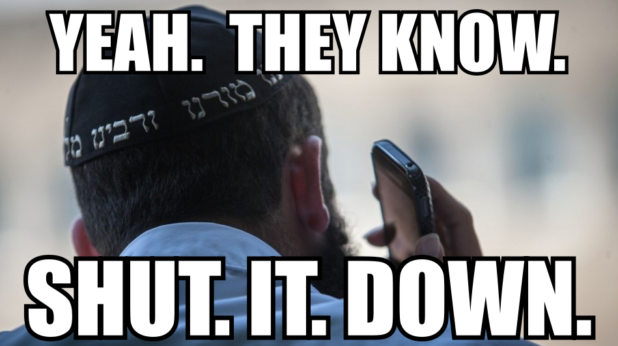Andrew Anglin
Daily Stormer
June 5, 2019
The editors of Bloomberg News, Jew Timothy Lavin and Clive Crook (who isn’t known to be a Jew, but I don’t know why a non-Jew would have that surname), are mourning the global trend of shutting down the internet.
Of course, they blame this on other nations, without mentioning the massive program – spearheaded by the Jewish media, of which they are a part – to shut down the internet domestically.
I don’t mind people bringing attention to abuse of the internet around the world, but it seems that as an American publication, their very first concern should be the shutting down of the internet in America. Especially when the entire tone of this piece is a lecture from the “free world” against the abusive oppressions of global anti-democracy.
Around the world, governments are hitting on a modish new idea: Turn the internet off. Sometimes they mean it literally.
Methods vary, but the trend is clear enough. Countries are increasingly ordering telecoms and other companies to block network access, shut down messaging services, or otherwise restrict digital applications or websites, usually citing public order or national-security concerns. In extreme cases, internet access can be “blacked out” entirely. Worldwide, such shutdowns rose to 188 last year, up from 75 in 2016.
Expect that regrettable figure to rise. For autocrats, the appeal is obvious. They can use such restrictions to suppress inconvenient news or unwanted opinions, censor political rivals, prevent activists from organizing, and stifle talk of government misdeeds.
Oh dear.
That sounds shockingly familiar.
A naive person may read this as tone-deaf – claiming that “autocrats” are silencing online speech to suppress opinions and political rivals or cover-up government corruption, while the US is engaged in exactly that. But it isn’t tone-deaf. It is just Jewishness. They always accuse others of exactly what they’re doing.
For instance, after voters cast ballots last year in an election widely seen as corrupt, the government of the Democratic Republic of the Congo blocked all internet access for nearly three weeks. The stated goal — which cost the impoverished country roughly US$3 million a day, according to one calculation — was to prevent “chaos.”
Even in democracies, such bans can be tempting. When terrorists killed more than 250 people in Sri Lanka in April, authorities shut down access to multiple social-media services for more than a week. That might have seemed justified in the moment: Messaging apps can accelerate the spread of disinformation, and further violence appeared imminent.
It seems to me that these reasons are better than the ones given by the US for shutting down speech, which amount to “mean words are hurting people’s feelings.”
But get this.
This part.
The problem is that there’s no evidence such bans work. They do nothing to moderate the anger that might lead to violence, and dedicated troublemakers can evade them with VPNs and other technology — or simply by spreading rumors the old-fashioned way. Shutdowns also tend to become a habit: They are imposed in India more often than in all other countries combined, sometimes for bizarre or trivial reasons.
“Bizarre or trivial,” eh?
You mean like launching a weeks-long campaign to ban parody videos of Democrat politicians, and going so far as to dox people who produce parody meme content? That kind of bizarre?
Or is there something more bizarre and trivial than that? I can’t think of anything, and Bloomberg doesn’t bother to give us any examples.
And the drawbacks are severe. Done rashly, internet blockages can impede vital communication, hinder the work of emergency workers, induce public panic, and encourage the spread of rumors in the absence of reliable news coverage. They might even encourage violence. Unsurprisingly, they’re also expensive: By one estimate, India’s shutdowns have cost more than US$3 billion over five years.
Now wait wait wait wait.
You’ve said this twice now, Jews – and I really think we need to consider this.
Shutting down people’s free speech might encourage violence?
This seems like important information, which should be part of the discussion about mass censorship in the West – not just in third world shitholes.
In general, then, such restrictions should be avoided. When deemed necessary in an emergency, they should by law be temporary, limited to a specified purpose, and subject to judicial review.
Yeah.
This is just… wow just wow.
These Jews are literally listing off every single complaint I have and every single argument I use to back up my complaints about internet censorship… but only applying it to other countries.
Even while censorship in the West is much more extreme than censorship in most third world countries. Certainly, there is a much broader group of topics that are being banned. Pretty much any of these countries are just going to be banning criticism of the government itself.
I was kicked off of the entire internet for making a fat joke about a woman who was active in a domestic terrorist organization.
The following topics are banned in the US now:
- Making fun of nonwhite races
- Talking about the behavior of the Jews
- Questioning trannies
- Questioning mass immigration
- Claiming that women are less competent than men
- Claiming that mass shootings are hoaxes
And, with this new Nancy Pelosi parody video campaign, the media is trying to ban all criticism or mockery of Democrat politicians.
Of course, the eternal refrain of these Jews is: “Oh, but it’s not the government doing it – these are all private companies colluding to silence speech that the media has deemed offensive, and this is a libertarian country, meaning that libertarian principles are more important than the Bill of Rights.”
But this is just total gibberish. The taxpayer paid for the government projects that invented the internet, and we paid for the entire infrastructure of the internet. But for whatever reason, control of it was turned over to private companies, who are allowed to be completely unregulated.
This is no different than if the government decided to take away any of your other rights by transferring their power to a private company.
Second: What if the media started harassing every single gun store and told them to stop selling guns to “racists” – and every gun store in America complied?
Third: What if the government hired a private army and then the private army came and told you they’re going to be sleeping in your house, and Congress said there was nothing they could do because it’s a private company?
Fourth: What if the government hired private police and they just barged into your house without a warrant and started rummaging through your stuff? And the government said it didn’t violate the Constitution because they’re not actually real cops?
And so on and so forth.
Anyway – none of that is relevant to the arguments made by the Bloomberg Jews as to why mass censorship is bad. They are making arguments about the effects of mass censorship, not the mechanism through which it is employed.
Meaning that it all applies to modern America.
And Bloomberg itself is part of the media that is demanding all of this censorship in America.
The media is the single driver of this mass censorship program. All of the tech companies themselves – even the ones owned by Jews – held out as long as they could, but the media stirred up a mob against them.
Twitter, Facebook and YouTube (Google) have banned any and all criticism of anything deemed politically correct. Amazon is currently involved in a mass digital book burning campaign. All spurred by the media.
And in the case of the Daily Stormer, we were kicked off of backbone services, and our domain – dailystormer.com, which the older readers will remember – was outright stolen from me by the “private company” Google.
I don’t remember Bloomberg specifically coming after me, but they certainly didn’t defend me. Aside from Tucker Carlson, the only major media outlet that defended me was the LA Times.
If censorship leads to violence and chaos, as Bloomberg claims, America should stop this insane campaign of mass censorship.
Let’s have the conversation.






